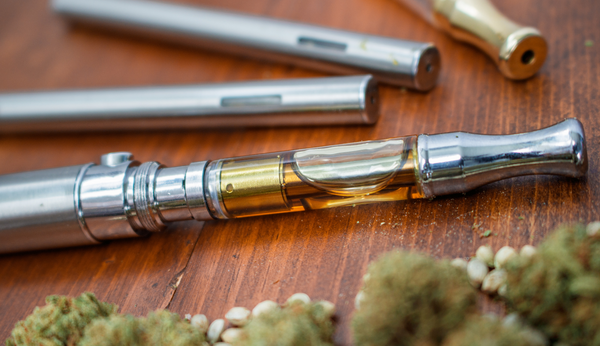Your Cart is Empty
FREE SHIPPING ON ALL ORDERS $75+
The 2018 Farm Bill legalized hemp, and subsequently Delta-8-THC, on a federal scale, but not every state agrees. Is Delta-8-THC legal in Iowa now that the state has finally legalized hemp as an agricultural commodity?
Not quite. Although Iowa has finally updated their hemp legislation to legalize hemp (and even CBD!), they still have restrictions on tetrahydrocannabinols. Delta-8 products should contain less than 0.3% Delta-8-THC by dry weight.
Here’s what you need to know about Iowa Delta-8-THC laws:
Disclaimer: We’re always working to stay informed on the latest Delta-8 laws and research. However, state laws are subject to change and we advise that you do your own research to verify the information you find in this article. This is not intended as legal advice.
Table of Contents
Delta-8-THC and Federal Laws
Iowa Delta-8-THC Laws
Is Delta-8 a Controlled Substance in Iowa?
Delta-8-THC Possession Limits in Iowa
Is Delta-9-THC Legal in Iowa?
Where to Buy Delta-8 in Iowa
Is Delta-8 Legal in All 50 States?
Resources
Iowa was late to join the hemp game, and the state’s USDA hemp plan was not passed until 2020. Although hemp and hemp derivatives were still illegal in the state until this point, the state’s Attorney General released a clarifying statement in May of 2020 to acknowledge CBD’s legality under the requirements laid out by the state’s new hemp plan.
In the updated legislation, Iowa defines hemp using a definition similar to the one used by federal legislation. Hemp and most hemp derived cannabinoids are now legal in the state, but the state unfortunately maintains a ban on tetrahydrocannabinols derived from cannabis in concentrations exceeding 0.3%.
This blanket statement includes delta-8-THC, so Delta-8 is still illegal in the state of Iowa. While it is one of only a few, Iowa isn’t the only state that has prohibited Delta-8 (see Colorado, Nevada, Rhode Island). Still, many of Iowa’s neighboring states do allow the sale and possession of Delta-8, including Illinois, Missouri, and Nebraska.
Here are some highlights from Iowa state law:
21—96.1(204) Definitions
“Hemp” means:
“THC” means total tetrahydrocannabinol as determined by an official laboratory test postdecarboxylation.
IOWA CODE 124 – CONTROLLED SUBSTANCES
124.101 Definitions
(1) 1 cis or trans tetrahydrocannabinol, and their optical isomers.
(2) 6 cis or trans tetrahydrocannabinol, and their optical isomers.
(3) 3,4 cis or trans tetrahydrocannabinol, and their optical isomers. (Since nomenclature of these substances is not internationally standardized, compounds of these structures, regardless of numerical designation of atomic positions covered.)
 Is Delta-8 a Controlled Substance in Iowa?
Is Delta-8 a Controlled Substance in Iowa?Unlike other states that have legalized Delta-8-THC (like Alabama, Maine, and Vermont), Iowa does not make exceptions for hemp-derived tetrahydrocannabinols in their Controlled Substances Act. All tetrahydrocannabinols, their derivatives, and isomers, are considered Controlled Substances in the state. Therefore, yes, Delta-8-THC is a controlled substance in the state of Iowa.
Because Delta-8 is illegal in Iowa, there are no defined possession limits for the cannabinoid.
No, Cannabis and all tetrahydrocannabinols are illegal in Iowa. Although the state has attempted to pass cannabis legislation multiple times, cannabis is still prohibited both for medical and recreational use in Iowa.

Delta-8-THC is illegal in Iowa and cannot be legally purchased in the state.
In places where Delta-8-THC is legal, many people prefer to shop online. It's advisable to proceed with caution when choosing a Delta-8 distributor. Shopping online allows you to buy directly from a brand or manufacturer, instead of purchasing through a third-party vendor that may not fully understand Delta-8 effects and uses or the laws surrounding Delta-8 products.
At Vida Optima, our Delta-8-THC products comply with all parameters of the Hemp Farming Act of 2018. We can also help answer questions about Delta-8, or you can read our “What is Delta-8-THC?” guide to learn everything you need to know.
Delta-8-THC is currently federally legal under the context of the Hemp Farming Act of 2018, but each state has the right to determine their own stance on tetrahydrocannabinols derived from hemp. Delta-8-THC is illegal in Iowa according to state law, but you should read more about Delta-8 laws by state to determine the legality in other areas.
Yes, Delta 9 THC is legal in Iowa, but there is a concentration limit set both federally and within the state. According to federal law, Delta 9 concentrations must be at 0.3% or lower on a dry weight basis.
Yes, you can legally travel with Delta 8 THC as long as the Delta 9 THC content is less than 0.3% and it is legal in both the departure and destination states, according to TSA regulations.
Delta 11 THC is likely prohibited in Iowa, as the state prohibits cannabis-derived tetrahydrocannabinols above 0.3% concentration. However, specific regulations regarding Delta 11 THC may vary, so it's advisable to check state laws for the most accurate information.
Delta 8 THC is legal in Iowa if its THC levels are 0.3% or less, according to state law. Vague language within both state and federal laws has created loopholes allowing products with varying THC levels to be legally purchased, including by minors.
Comments will be approved before showing up.



